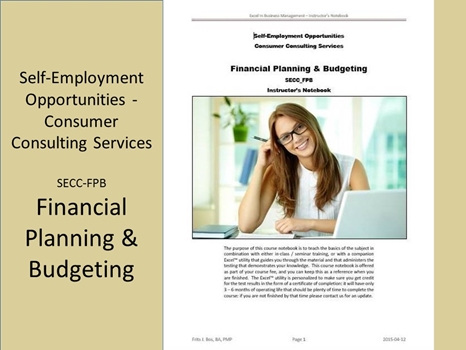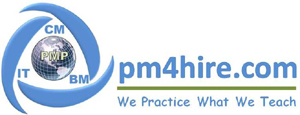
Financial Planning & Budgeting Program SECC_FPB
The top reason for why consumers run into financial problems is a lack of financial planning and budgeting skills. TV reality shows feature individuals that have spending problems, or that are unable to make ends meet, until they are given direction by the show host. Many people watch these shows to learn, rather than to relish in the misfortune of the show participants: they find it all too easy to identify with these problems. Over 80% of Canadians die without a will or other exit planning preparations. In many cases individuals are nervous about planning ahead because of the perceived cost of help in those areas (accountant fees, lawyer fees, etc.). The focus of this opportunity is to master the skills required to establish plans for clients that need help, and how to use our Excel™-based software to help sort out their financial situation.
Contrary to what people think, it is not necessary to engage high-priced accountants and lawyers to get one’s affairs in order. You can be a coach and provide clients the advice and encouragement so they can achieve the same results seen on TV. Once you have the training then dealing with basic personal financial planning becomes quite easy. Helping people plan for retirement, to establish a last will and testament, and to manage estates upon death are all services you can provide based on simple, readily available information, except that it is difficult to sort out where to find it. With this training program you have the information at your fingertips and you can coach clients.
You may think there are enough resources for people to turn to: reality is that those resources tend to have some kind of sales relationship, and are interested in helping people only if they can write up some new business. As a coach you will be very up-front with your charges, and provide those services clients need for them to turn the corner on opportunities that were missed. Many people are mired in debt, they are not likely to buy investment instruments, and therefore they are not a prime candidate for the majority of professionals that otherwise provide money management and investment counseling advice. There is a serious lack of resources to help people before they get into a heap of financial trouble, and this course teaches you how to be the coach, and how to sell your services as a coach.
One of the things you will experience as a coach is that often people hold out until they finally acknowledge that they need help as a last resort. You have to be prepared to parachute into a crisis situation, and to remain calm to find ways in which their financial crises can be resolved. It is important to grasp at what level individuals operate: some are focused on surviving; others want a plan to get ahead. It is important to be client centric and not to project your perspective of what would be a good idea as your client’s objectives. In this first part of the course we explore the issues people face, and how people are counseled into financial troubles that benefit someone else. We will explore how through coaching you can help clients develop a better understanding of what is required to turn the corner on debt and to plan to get ahead.
People need to have a plan for how to accomplish their objectives. There is no need to go overboard with formalities, but it is important to get things put in writing if only so people have a tangible target to work towards. There is a world of difference between desires and reality – you need a plan to make a dream become reality, and most likely one of the cornerstones of the plan is how to get out from under crushing revolving credit debt. Remember that it is more important to make steady progress than to achieve a specific result by a specific target date. The critical success factor is that both partners are in agreement, and that the right priorities are pursued. It also means that the right protection is in place so assets are insured in case of various disasters, as determined by a thorough assets inventory.
One of the major stressors in relationships is money management, which can be a function of different objectives, or a more serious issue of not agreeing to how such objectives may be achieved. This part of the course is perhaps a mirror of the reality TV shows on money management – the problem is real, the techniques can be a lot more effective if we use the appropriate tools for the job. The tools we use are much simpler than accounting software, which means almost anyone can learn to track expenses and monitor how that does stack up to the budget objectives we may set. As a coach, you will help many individuals to come to grips with the challenges they face, and perhaps find trade-offs where partners can more easily agree on what it takes to achieve the results they are both aiming for.
Long-range planning, and in particular retirement planning, are critical parts of an individual’s financial planning and budgeting objectives. There are key milestones people look forward to, like buying a house, or starting a family, or other milestones that can have a dramatic impact on their financial needs. While the basic focus of planning and budgeting takes care of many aspects of life, one aspect that remains challenging is retirement planning. Based on advertising people can develop warped expectations of what will await them in retirement – the reality of living much longer than was anticipated in most of these “Freedom 55” plans means you have to be a lot more frugal, or find other ways to supplement your retirement income. In this segment we look at the concerns and consequences related to retirement planning, and what coaching (aspiring) retirees can do to help them achieve a desired lifestyle.
This segment of the training dispels the belief that you need to engage high priced help in order to look after the affairs of a deceased: in fact, Ontario is one of many jurisdictions where that is unnecessary. People hear attorney, and they think of lawyers – in Canada these terms have different meanings as opposed to the confusion created by “attorney” as used in the USA. We will look into “Continuing Power of Attorney for Property” – where individuals establish who will look after their affairs while they are incapacitated but still alive, or “Power of Attorney for Personal Care” – to decide whom to entrust with making health care decisions should a person become physically unable to communicate their desires to medical staff. Finally, there is planning for a “Last Will and Testament” – to document how to make sure the estate goes to the heirs per the wishes of the testator rather than to be distributed by the government according to legislation.
This segment of the training reviews the actions required upon the death of a testator (or testatrix) to make sure everything is taken care of according to the laws of Ontario. This is based first on coaching testators on how to write a solid will, and then on coaching estate trustees in the management and settlement of the testator’s affairs after death. This includes checklists for all the different government agencies and business organizations that may have to be notified, but most importantly that the dependent survivors are looked after and that they have access to what they need to be able to carry on. The estate trustee does not have to be high-priced professional help either, as in any case the execution of the estate plan will be audited by the government.
Learning Formats SECC_FPB
This course is currently available in a classroom setting (public or company private) with approximately 60 contact hours.
PDF – Certificate Of Completion
Each course offers a certificate of completion that identifies the course, the student, and a brief description of the course. To receive a certificate the student must have attended at least 80% of the course sessions. This personalized certificate is forwarded to the student by Email.
PDF – Course Notebook
Each course includes a notebook in PDF format that provides the minimum knowledge the student must master in order to obtain the certificate. In the notebook you will find references to other study materials. Students receive the notebook by Email when their registration is confirmed.
PDF – Program Overview
An overview of this study program can be downloaded from the website by right-clicking on the program link on the enquiry page.
PDF – Current Training Schedule
A list of upcoming training sessions can be downloaded from the website by right-clicking on the schedule link on the enquiry page.
Registration – Service Providers
To register for any training course please look on the enquiry link page of your service provider (from where you accessed this website). On the page you will find a registration request form where you can order the course that you are interested in. The availability dates will be provided to you, along with payment instructions if you decide to go ahead.

 |
|